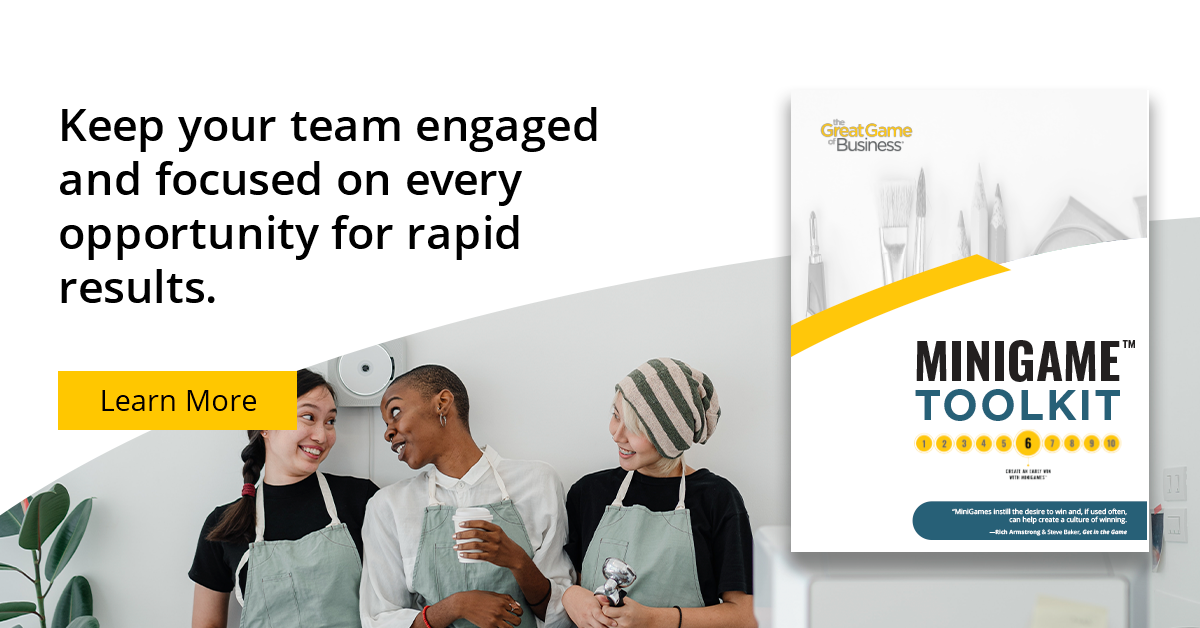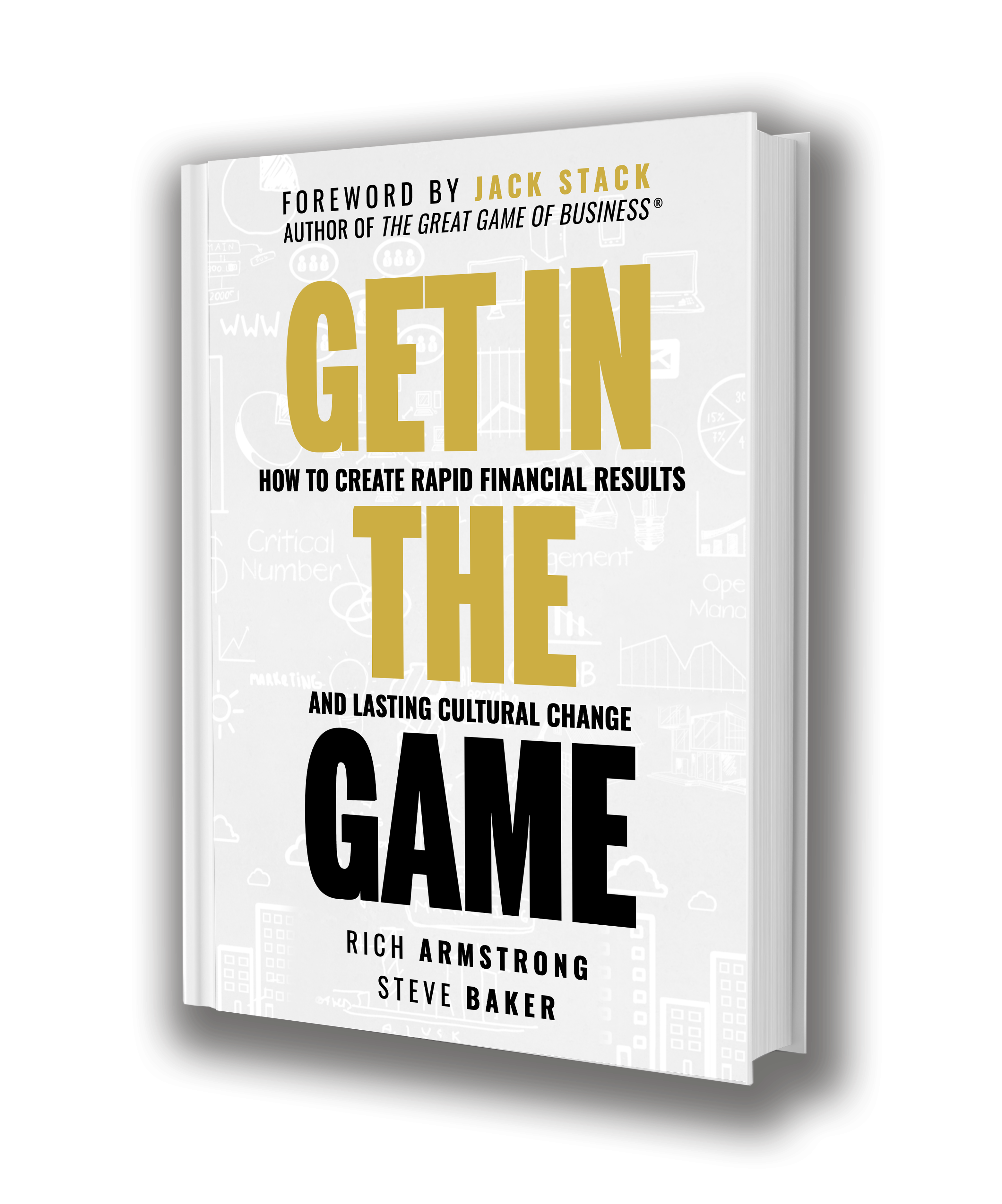
Those of you who have already identified your Critical Number™ (company-wide goal) and the drivers that go along with that goal, will find that MiniGames™ are a great way to bring a laser focus to create small, everyday wins that put you that much closer to the big win. If you, are new to Great Game you might start learning more about how to identify your Critical Number.
MiniGames
MiniGames™ are short-term, intensely focused, ‘continuous improvement’ campaigns designed to affect a change, correct a weakness or pursue an opportunity within the organization. There is a team goal, a way to keep score (Scoreboard) and a reward for winning; usually self-funded by the improvements made.Small Wins Add up to Big Wins
Not a day goes by that we don’t hear someone in the Great Game™ community telling us a story about how their frontline people have astounded them with creativity, innovation, and dogged determination to achieve a goal. Most of this praise surrounds one of our favorite practices: MiniGames.
Once you’ve seen the transformational power of The Great Game of Business, your team will begin to grab on to the gamification aspects and, along with them, the language. Words like Huddles, Scoreboards, and so on will become part of the vernacular of your organization. MiniGames are a powerful example of gamification.
Why Play MiniGames?
Playing MiniGames is a relatively simple practice that can create powerful engagement and bottom-line results. MiniGames are like small incentive plans targeted at day-to-day improvements that add up to year-end success. They’re played to effect a change, reinforce business education, build teamwork, and create a culture of winning—all of
which lead to success for the company and for the players.
Effect a Change
The primary reason for playing a MiniGame is to strengthen the business by driving results through improved performance. MiniGames help companies boost work-group, departmental, and corporate performance by focusing on an operational or financial number that represents a weakness or an opportunity. MiniGame teams are challenged to find solutions to current problems and take advantage of current opportunities—whatever it takes to get to the goal! The best MiniGames effect a change in a system, process, or behavior that will stick long after the MiniGame is over.
Reinforce Business Education
MiniGames are one of the most effective tools used to build a business of businesspeople. MiniGames provide the opportunity for employees to practically apply the business education they receive and to learn even more as they play. Since many (or most) employees are unfamiliar with reading and acting on financial information, MiniGames focused on nonfinancial drivers or measures are the key to teaching
managers and employees how to connect their work to the financial outcomes of the company. MiniGames also reinforce key principles and practices of The Game. Employees learn to set goals, keep score, run effective Huddles, practice forward forecasting, and hold each other accountable, experiencing The Big Game in microcosm.
-1.png?width=80&height=80&name=Coachs%20Tip%20Chat%20Bubble%20(1)-1.png)
Download Our eBook Containing 28 Different MiniGame™ Ideas
Build Teamwork
MiniGames provide the people on a team (work group or department) with a shared common goal. While individual contribution is valued, individuals must unite as a team in order to reach the goal. MiniGame rewards are based on the success of the team. The shared reward gives each player a vested interest in helping the team achieve its goal. MiniGames underscore the concept that we’re all in this together. It’s the number we are competing against, not each other. Through MiniGames, employees learn that a united team is vital to success at every level of the company.
As a short-term version of the Great Game, MiniGames also reinforce key components of team success—goal setting, mutual responsibility, and performance management—by teaching players to track, measure, and report team activity by showing them how they can contribute to team success and by rewarding them when they do.
Create a Culture of Winning
Face it—most people don’t wake up feeling like winners. Life’s hard. Maybe, just maybe, we could create a winning environment at work in which people are recognized and results are rewarded. MiniGames instill the desire to win and, if used often, can help create a culture of winning. The more MiniGames are played, the more opportunities
employees have to win. The more employees win, the more they want to win. Why not make winning a habit?
This blog was inspired by Rich Armstrong and Steve Baker's book Get in the Game. Find out more about the step-by-step guide to implementing the Great Game of Business below.
To learn how to create your own MiniGame, checkout our MiniGame Toolkit.
Other articles you might like:
- 6 Easy Ways to Reward and Recognize Employees
- Rewards That Will Strike Out with Your Team
- Creating a Recognition Culture: Best Practices
.png)







.png)




-5.png)

